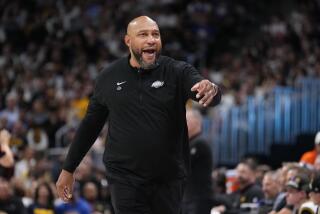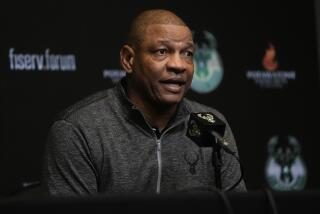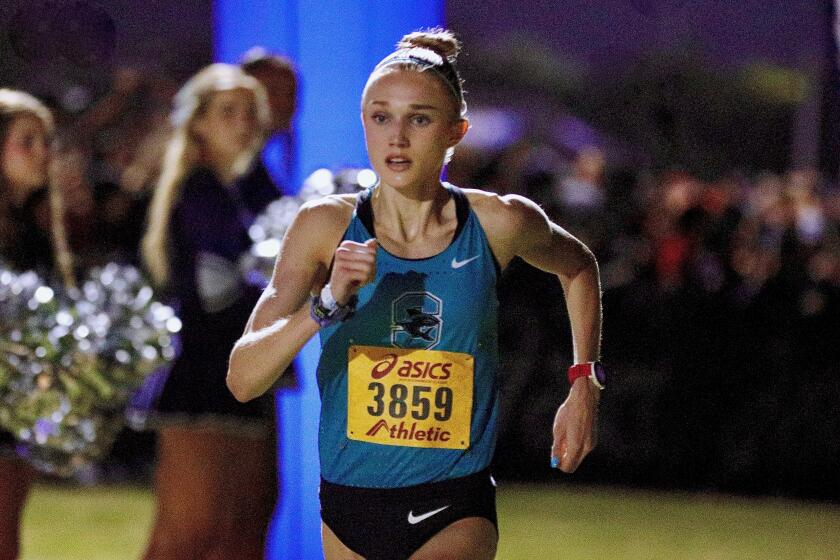Great Read: Doc Rivers has been a shot in the arm for the Clippers
The Clippers’ conversion from NBA franchise to Doc Rivers Inc. can be traced to the summer night their new coach sat across from their freakishly athletic center at a trendy Japanese restaurant in West Hollywood.
Over albacore tuna and yellowtail sushi, Rivers laid out his plan for DeAndre Jordan to become his team’s defensive captain.
The coach ticked off a handful of names: Dennis Rodman, Tyson Chandler, Ben Wallace. None were big scorers. All had won NBA titles by playing relentless defense.
“You can have a dramatic impact on the game,” Rivers told Jordan, “without being a great scorer.”
Rivers couldn’t be sure how Jordan would take what he had to say. There had been reports that the Clippers had tried to include the unfocused big man as part of the deal that brought Rivers to Los Angeles in June for a first-round draft pick. Jordan had to wonder: Did the man sitting before him even want him here?
But the longer Rivers talked, and the more sushi they ate, the more Jordan was reassured. Rivers made Jordan feel as if the Clippers could not win a title without him playing a major role.
“From the moment that we first talked and had a face-to-face conversation,” Jordan said, “I knew how genuine he was in believing in me.”
It wasn’t long before Rivers instilled a similar self-confidence in the rest of the Clippers, selling them on what he believed to be the optimal version of each player.
Forward Blake Griffin, known for his high-flying dunks, would take more midrange jumpers to diversify his offense. Star playmaker Chris Paul would look for his shot more often and be more aggressive. There was even a directive for rookie forward Reggie Bullock to “shoot the ball and defend like crazy.”
From the Clippers’ first pre-season practice, there was one message, one goal and one throaty voice presiding over it all. Rivers was remaking seemingly every aspect of his team to fit his championship vision. And his title-starved players were eager to listen.
“Doc’s done a good job of letting everybody know, ‘This is how it’s going to be. This is what it is. You have to fall in line or you’re not going to play,’” Griffin said. “When that’s a real threat, that’s when it works.”
Doc’s orders have elevated a team that has been a punch line for most of its 44-year existence, making it a more realistic title contender than the teams that lost early in the playoffs the last two years. As they head into the playoffs this weekend at Staples Center, the Clippers have won a second consecutive division title and set a franchise record for regular-season victories.
Rivers wants more, of course. A championship would give him something besides giant pictures of his best players to hang from the rafters inside the team’s home arena.
“I just think, what’s wrong with going for it?” said Rivers, 52. “And if you fail you fail, but damn it, I don’t want any parameters of, ‘Well, we still had a good year.’ I just think let’s go for it, let’s see what happens and if we don’t make it, let’s go for it again. But let’s get our heart broken or let’s fall in love, one of the two.”
As he observed Jordan at the dinner, Rivers’ long-held perception of “this angry guy” softened considerably. Jordan’s body language over the years told Rivers that the center was often upset that he wasn’t a bigger part of the offense. Now Jordan appeared eager to adapt — to be part of a journey bigger than himself.
“That day made me feel really good about our team,” Rivers said. “When I drove home from dinner that night, I was like, wow.”
The one player he thought would be a problem was suddenly the least of his worries.
::
Quiet was hard to find around the Rivers’ household when Doc was growing up.
His father, Grady Sr., was a voluble police lieutenant in the Chicago suburb of Maywood who instilled in his two sons many of his favorite mantras, such as “Finish the race” and “Trust everyone, but cut the cards.” The elder Rivers would do whatever it took to watch his sons play basketball in high school, even if it meant sitting along the baseline with his police radio blaring during the quiet of a free throw.
Doc’s older brother, Grady Jr., spent much of his time extricating his sibling from fights that invariably started because the young boy had a tendency to talk too much. Being chatty was a birthright in the family.
“His mom’s father was a politician and he had a way with words,” said Rivers’ uncle Jim Brewer, the former Laker and member of the 1972 U.S. Olympic basketball team.
The words that perhaps molded Rivers the most were written on the gym wall by his high school basketball coach, a former Marine named Glen Whittenberg: “If you think you’re so important to this team, stick your foot in a bucket of water. When you take your foot out, the hole you leave will be how much you’ll be missed when you walk out the door.”
The teenager, whose given name was Glenn, became “Doc” the summer Marquette assistant coach Rick Majerus spotted him wearing a Julius Erving (a.k.a. Dr. J) T-shirt at a basketball camp. He didn’t like the name at first but eventually relented.
Rivers went on to star at Marquette for three years before becoming an All-Star point guard with the Atlanta Hawks. He spent the 1991-92 season with the Clippers, helping them reach the playoffs for the first time since the franchise moved to Los Angeles in 1984.
It seemed obvious to those around him that the demanding yet galvanizing Rivers would eventually coach. He established a reputation as an ally of his players in his first season with the Orlando Magic in 1999-2000, when he was selected the NBA’s coach of the year. He also quickly won over the media by participating in a flag-football league.
But Rivers never made it past the first round of the playoffs in Orlando and he was fired early in his fifth season. It took him four years and the accumulation of three stars — Kevin Garnett, Paul Pierce and Ray Allen — to win his only NBA title with the Boston Celtics in 2008.
Rivers might have finished his coaching career in Boston, but last summer the team was facing a complete overhaul and the prospect of a dreadful season seemed far less enticing than the chance to guide the Clippers’ promising core of Paul, Griffin and Jordan.
Rivers showed from his first day on his new job that he could work a room like a seasoned politician, making eye contact with just about everyone, joking and offering a warm pat on the shoulder as he walked by.
He likes to spend the first few minutes of every pregame session with reporters chatting about random topics: NFL free agency, USC basketball or even Warren Buffett’s NCAA tournament bracket challenge.
“We need another week,” Rivers said last month when asked who he was picking to win the college championship. “I don’t want you to try to fill out that billion-dollar pool, OK?”
One of the reporters said that if he won, he would quit and leave the Clippers beat.
“Then I will help,” Rivers deadpanned, triggering laughter in the room.
The coach also likes to keep things light with his players. He pretended to reel in Paul with an imaginary fishing rod at a recent practice when the point guard’s session with reporters was longer than Rivers would have liked.
There are times when Rivers makes his point by keeping his mouth shut. He hasn’t said one word to star sixth man Jamal Crawford, one of the league’s most skilled scorers, about his offense.
“It’s always defense and that’s it,” Crawford said. “Defense and he always tells me to be aggressive.”
Rivers made transition defense a priority and changed the way his team guarded three-point shooters by having players apply pressure on the perimeter more quickly. The adjustments have worked. The Clippers are holding teams to 33.1% shooting from beyond the arc — ranking as the best three-point defense in the NBA — after being 26th last season.
‘Whenever I go off course,” Jordan said of his defense, “Doc brings me right back in and reminds me what I need to do.”
::
Days off have become routine for a team that has slogged its way through an 82-game schedule. Beat reporters have come to expect an email from the media relations department reading: “The Los Angeles Clippers will not practice tomorrow” after almost every game.
Most players show up anyway for individual workouts, a tribute to the collective mission.
Rivers tries to lighten his players’ mental workload as well as preserve their bodies. The coach repeatedly heard that his players hated the long film sessions from previous seasons, so he plays only snippets as they stand around a screen next to the practice court.
It was during a solo film session that Rivers discovered his biggest challenge. Watching footage of the Clippers’ first-round playoff loss to the Memphis Grizzlies last season, Rivers saw that missed shots and turnovers didn’t doom the team as much as slouched shoulders and grimaces.
“I told them that right when I got here,” Rivers said as he sat in his office that overlooks the practice court. “I’m like, ‘Watching that series last year, if I was the other team, I know I’ve got you. I can just look at you.’
“What I’m just trying to get them to understand is bad things happen and you can still win. Don’t worry about it. There’s going to be no perfect basketball played in the playoffs. We’re going to play awful in a couple of games and if we keep our mental focus, we can still win those games.”
A lot can go wrong in a six-month season. Paul and Crawford have missed extended periods because of injuries. Forward Matt Barnes sent out a rogue tweet including the N-word. Forward Glen Davis verbally challenged Rivers after he was quickly removed from a game.
Through it all, the players haven’t splintered. They have avoided infighting in the locker room and have won 12 games in which they’ve trailed by at least 10 points. Rivers made everyone feel valued by treating All-Stars Paul and Griffin the same as end-of-the-bench center Ryan Hollins.
“At the beginning of the season, I would say we weren’t as close,” Jordan said. “We would kind of break a little bit, but [Rivers] would always say, ‘You’ve got to come together when it gets harder. You’ve got to embrace being good. You have to embrace the game being challenging and hard.’
“So now when things happen, I don’t think we get flustered as much or even at all. We just keep going.”
Rivers doesn’t believe he has done anything special. He credits his players.
“Let me be clear: It’s not me,” Rivers said. “It’s them. Like, they decided to improve, not me. I push them, but at some point a player has to make a choice: Does he want to want to work on it and improve? Blake has been phenomenal. But Blake decided to improve. Not, Doc Rivers said, ‘You improve’ and you improve.”
The NBA’s awards season could reflect the Clippers’ growth.
Griffin has been talked about as a contender for most valuable player and Jordan has become the shot-blocking, rebound-grabbing force Rivers envisioned, putting him in the running for both defensive player of the year and most improved player. Crawford has a chance to win the sixth-man award given to the best player coming off the bench.
One award has already been unofficially bestowed, though it would be more meaningful if the Clippers can make a deep playoff run.
“Doc is the true MVP,” Crawford said, “to get everybody to buy in.”
Twitter: @latbbolch
More to Read
Go beyond the scoreboard
Get the latest on L.A.'s teams in the daily Sports Report newsletter.
You may occasionally receive promotional content from the Los Angeles Times.











